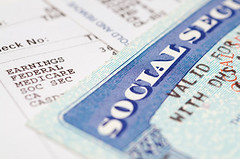Kimberly PalmerComing Soon: $500 for Every Newborn?Imagine a world where every baby received a trust fund at birth. It might sound like a fairy tale, but being born into money--or at least into a $500 savings account--could soon become reality for all children born in the United States. Lawmakers are considering a bill that would give each newborn just that, with the goal of promoting savings that would later be used for education, a first home, or retirement. Here's what you should know about the ASPIRE ("America Saving for Personal Investment, Retirement, and Education") Act:
How would this program work?
The ASPIRE Act would give each child born in the United States a $500 savings account. Recipients could then use that money once they were older to pay for education, a first home, or retirement. Low-income children would receive additional funding, and all participants could add to their accounts over time.
Would it really help people save more money? Five hundred dollars isn't much.
The purpose of the accounts, says Reid Cramer, director of the Asset Building Program at the New America Foundation, is to get people invested in their future. "Having an asset has the potential to change the way people think and plan for their future, and sometimes those effects can be generated just from small asset holdings," he says, adding that it's possible for people to build up significant savings over time. The ASPIRE Act also pairs the creation of the accounts with financial literacy programs in schools.
Indeed, pioneering research by University of Michigan professor Michael Sherraden suggests starting individual savings accounts for lower-income people can lead them to feel more confident about the future. Recipients of such accounts also report feeling that they have greater control over their lives, including the ability to plan for education and retirement costs. Further studies have shown that owning assets is associated with greater empowerment and civic participation, increased income, and positive educational outcomes.
Why not just give the money to low-income people who really need it?
Entitlement programs that benefit everyone, such as Social Security and Medicare, tend to enjoy more widespread support and therefore last longer. Programs aimed exclusively at lower-income groups, such as welfare programs, often attract more controversy and receive less political support.
"The important thing is that everybody gets an account," says Cramer, and that it's opened automatically so families don't need to take much action. It would still be a progressive program, he adds, because as the ASPIRE Act is currently written, poorer families would receive additional funding.
Don't we already have a lot of policies in place that encourage savings?
Yes, but they tend to mainly help people with higher incomes. According to Sherraden, two thirds of retirement tax benefits go to households that earn incomes of $100,000 and higher. Policies that encourage homeownership, such as tax deductions on interest payments, similarly benefit those who can already afford to purchase homes. Other savings systems, such as 529 accounts for college savings, depend on parents opening the accounts and making deposits. The ASPIRE Act is different because each child would have an account and receive an initial deposit.
Has this been tried anywhere before?
Yes--in Great Britain. Since September 2002, children born in the United Kingdom have received a $500 savings account, just as the ASPIRE Act would provide in the United States. Recipients can withdraw the money after the age of 18; unlike in the proposed U.S. version, there are no restrictions on how they can spend the money. About one quarter of the recipients add extra money to the account, and, according to calculations by Cramer, most of the accounts go up in value so they are worth over $600. (The money is invested in a diversified portfolio of stocks, much like college savings, or 529, accounts in the United States.) Since the program's first enrollees are now only 7 years old, it's too early to say how they will spend the money once they turn 18.
Could this really become law in the United States sometime soon?
Lawmakers are expected to reintroduce the ASPIRE Act before the end of the year, and it already enjoys bipartisan support. The main challenge for supporters will most likely be over how to justify the cost at a time of great budget deficits and competing demands for federal dollars. Critics argue that the program would simply create another costly entitlement program. Writing for the Portland-based think tank Cascade Policy Institute, policy analyst Sreya Sarkar says the program would provide benefits to one generation by taxing another.
How would this program be paid for?
Over the first decade of its life, the program would cost around $37.5 billion, and would start at around $3.25 billion per year. Cramer argues that because the money would be invested through the savings account, it would help spur economic growth. Lawmakers sponsoring the bill have said they would pay for it by making other cuts, but the bill doesn't specify what those cuts would be.


















